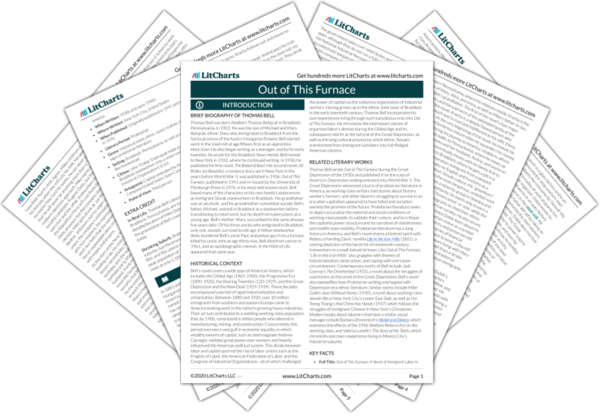John “Johnny” Dobrejcak / Dobie Quotes in Out of This Furnace
He was a child of the steel towns long before he realized it himself.

Unlock explanations and citation info for this and every other Out of This Furnace quote.
Plus so much more...
Get LitCharts A+There were few who didn't find something brave and hopeful in its mere presence, the soiled curtains across the windows of what had been a vacant store as heart-lifting as a flag in the wind.
The very things the Irish used to say about the Hunkies the Hunkies now say about the niggers. And for no better reason.
You know, you really ought to be allowed to pick your own place to be born in. Considering how it gets into you.
They were all sorts of men, Scotch and Irish and Polish and Italian and Slovak and German and Jew, but they didn't talk and act the way the steel towns expected men who were Scotch and Irish and Polish and Italian and Slovak and German and Jew to talk and act.
That was where a hearing of this kind should have been held, in the mill yard or in one of the First Ward's noisome alleys, where words and names were actual things and living people, beyond any lawyer's dismissal—smoke and machinery and blast furnaces, crumbling hovels and underfed children, and lives without beauty or peace.
All over America men had been permitted, as a matter of business, as a matter of dollars and cents, to destroy what neither money nor men could ever restore or replace.

John “Johnny” Dobrejcak / Dobie Quotes in Out of This Furnace
He was a child of the steel towns long before he realized it himself.

Unlock explanations and citation info for this and every other Out of This Furnace quote.
Plus so much more...
Get LitCharts A+There were few who didn't find something brave and hopeful in its mere presence, the soiled curtains across the windows of what had been a vacant store as heart-lifting as a flag in the wind.
The very things the Irish used to say about the Hunkies the Hunkies now say about the niggers. And for no better reason.
You know, you really ought to be allowed to pick your own place to be born in. Considering how it gets into you.
They were all sorts of men, Scotch and Irish and Polish and Italian and Slovak and German and Jew, but they didn't talk and act the way the steel towns expected men who were Scotch and Irish and Polish and Italian and Slovak and German and Jew to talk and act.
That was where a hearing of this kind should have been held, in the mill yard or in one of the First Ward's noisome alleys, where words and names were actual things and living people, beyond any lawyer's dismissal—smoke and machinery and blast furnaces, crumbling hovels and underfed children, and lives without beauty or peace.
All over America men had been permitted, as a matter of business, as a matter of dollars and cents, to destroy what neither money nor men could ever restore or replace.











